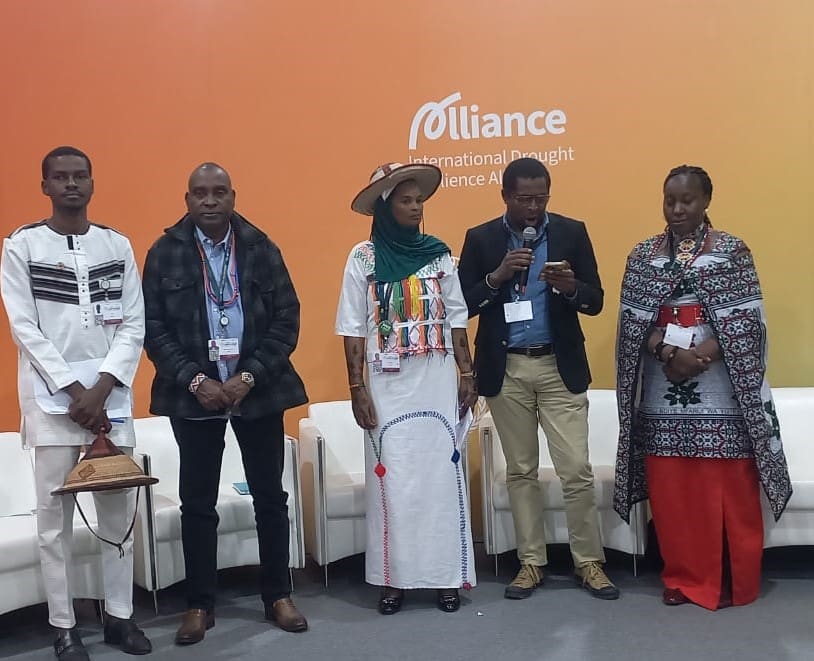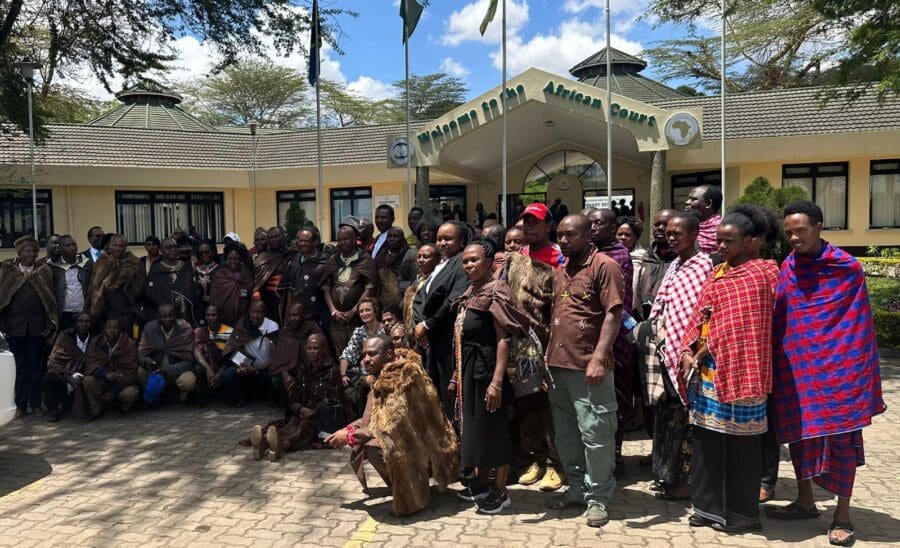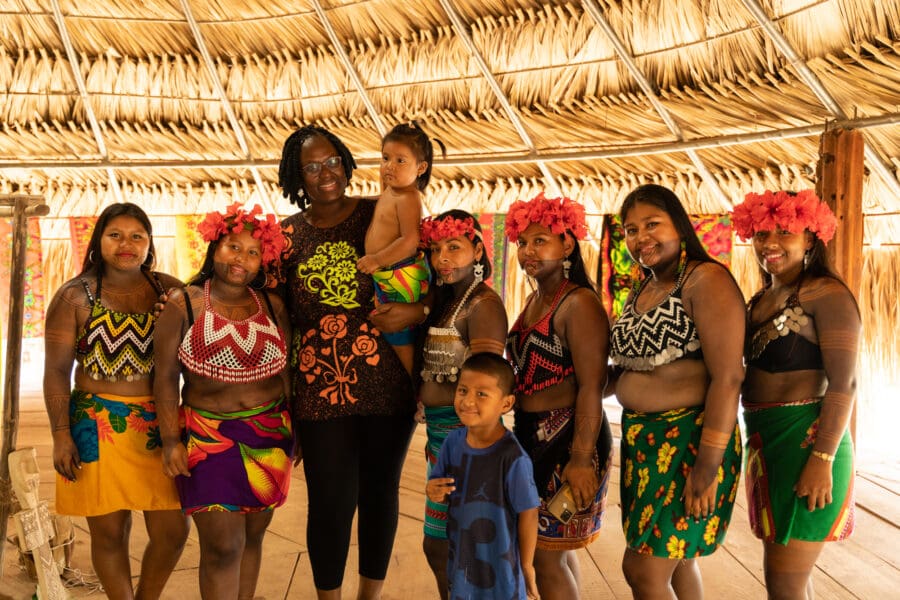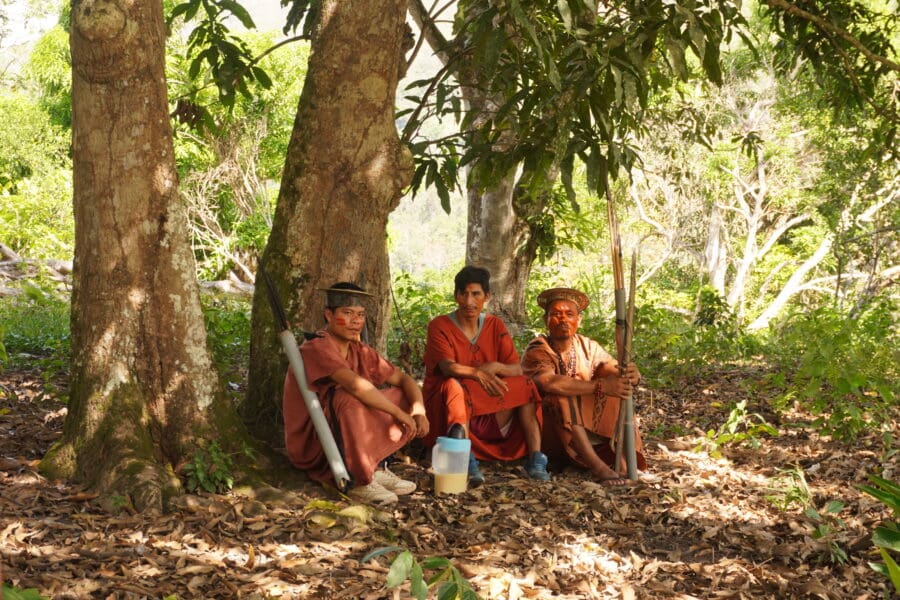The gavel has sounded at the 16th Conference of the Parties to the United Nations Convention to Combat Desertification, colloquially known as UNCCD CoP16. Over 23,000 participants representing governments, civil society organizations, and private sector actors converged on Riyadh, Saudi Arabia to debate and define a response to the global threat of rising aridity: in the last three decades, more than three-quarters of the world’s land has become drier, and during this period, the population living in drylands has doubled to 2.3 billion, more than a quarter of the global population.
This was by far the largest UNCCD CoP to date (the previous CoP15 in 2022 had 7,000 participants), but even in an increasingly crowded space, Indigenous voices rang loud and clear, achieving several important breakthroughs.
Here are some of the highlights from a CoP that several leading Indigenous advocates are calling “historic.”
First Indigenous Peoples Forum
December 7 witnessed the first-ever Indigenous Peoples Forum at a UNCCD CoP. The high-level event featured Indigenous representatives from all seven UN socio-cultural regions, current and former heads of state, UN agencies, and government ministries. They discussed how existing participation and financial support mechanisms within UNCCD and other multilateral processes can better recognize and support Indigenous Peoples’ contributions, as well as how to ensure that Indigenous Peoples can get direct access to funding to support their leadership in land restoration. The forum featured a stirring welcome invocation by Indigenous Peoples from the Pacific, poetry from Indigenous youth, and an almost festive atmosphere that underlined the deep and vibrant connection between Indigenous Peoples and the lands they protect and steward.
Sacred Lands declaration
After the conclusion of the forum, Indigenous representatives at CoP16 released Sacred Lands, a declaration calling for the recognition of Indigenous rights in UNCCD policies and actions. The declaration highlighted the value of Indigenous knowledge systems and demanded access to direct funding, including a dedicated fund for Indigenous Peoples’ land restoration, conservation, and drought resilience initiatives. It also called for the full, effective participation of Indigenous Peoples, including women and youth, as distinct rightsholders.
Establishment of the Caucus of Indigenous Peoples and the Caucus of Local Communities
In response to the Sacred Lands Declaration, the UNCCD Secretariat agreed to establish two new formal bodies: the Caucus of Indigenous Peoples and the Caucus of Local Communities.
While the UNCCD CoP16 already featured a formal Youth Caucus and Gender Caucus, there was no formal platform for Indigenous Peoples or local communities. Their engagement with formal UNCCD processes was thus channeled through the Civil Society Caucus, often leading to the dilution of their voices as part of broader civil society demands.
The UNCCD is the first of the three Rio Conventions to establish two separate caucuses for Indigenous Peoples and local communities. These caucuses should ensure greater representation in official processes, and further amplify the unique perspectives and priorities of Indigenous Peoples and local communities.
“For 31 years, UNCCD has ignored Indigenous Peoples in its policies and actions. At COP16 that changed,” –Dr. Peggy Smith, scholar of Indigenous Cree ancestry from the James Bay Treaty #9 area in Canada, and RRI Board Chair
Increasing focus on Indigenous pastoralists
As the traditional custodians of the world’s rangelands, Indigenous pastoralists are on the frontlines of desertification. This is why, RRI supported a delegation of pastoralists from across Africa to participate in CoP16 and co-organized a side event with Mainyoto Pastoralists Integrated Development Organization (MPIDO), and RRI’s Community Land Rights and Conservation Finance Initiative, which, over the past three years, has supported over 100 projects to 67 Indigenous, Afro-descendant, and local community-led organizations in 26 countries. As Joseph Ole Simel, a Maasai pastoralist and executive director of MPIDO pointed out during the event, pastoralists have remained resilient in the face of colonialism and drought thanks to collective governance systems, a culture of collective response to crisis, and mobility as a pillar of communities’ relationship with the landscape. Policies that limit pastoralists’ mobility threaten their livelihoods and can lead to overgrazing, a key driver of land degradation and desertification. Policies that limit pastoralists’ mobility threaten their livelihoods and can lead to overgrazing, a key driver of land degradation and desertification.

Bouba Aeisatu, another member of the delegation who is a Mbororo pastoralist and executive director of the Cameroon Indigenous Women Forum, highlighted several specific ways that drought and desertification disproportionately affect women pastoralists: having to travel farther to collect water increases their vulnerability to physical and sexual violence. Decreasing water supplies means that cows produce less milk, which is an important source of livelihood for pastoralist women.
From Africa to Asia to the Arctic, and from the Middle East to Eastern Europe, pastoralists face similar pressures, including the conversion of rangelands and large infrastructure projects on their lands with no prior consultation. In addition to providing critical insights to inform RRI’s emerging analysis of Indigenous pastoralists’ mobility and tenure rights, CoP16 was a strategic platform for knowledge sharing and international alliance building ahead of the 2026 International Year of Rangelands and Pastoralists.
Shifting narratives
Despite customary claims to nearly half the world’s land, Indigenous Peoples, Afro-descendant Peoples, and local communities hold legal ownership rights to just 11% of the land, with limited rights to an additional 7%. As such, any global plan to combat land degradation must address these communities’ land rights.
Pasang Dolma Sherpa, Executive Director of the Center for Indigenous Peoples’ Research and Development (CIPRED) in Nepal and CLARIFI Steering Committee member, called for a paradigm shift at CoP16 in how Indigenous Peoples are viewed and engaged: “We need to change the narratives of Indigenous Peoples, not just as vulnerable, but as key actors and safe guardians who need to be promoted, protected, and recognized. Indigenous Peoples’ knowledge and cultural values are the backbone of our sustainable future. What happens if you don’t have a backbone?”
Hindou Oumarou Ibrahim, Chair of the UN Permanent Forum on Indigenous Issues, shared a similar sentiment: “Treat us as partners: we can teach you to nurture soils, trees and ecosystems, and you can teach us to navigate your reporting requirements.”
The important breakthroughs achieved at CoP16 signal progress toward more inclusive and equitable land restoration policies, and they deserve to be celebrated. Yet the journey is far from over; ensuring that commitments made at CoP16 translate into tangible change on the ground requires continued advocacy and collaboration.
To stay updated on these developments and to support the movement for rights-based responses to land degradation and restoration, click here to sign up for our newsletter today!
For comments or questions, please email Nicole Harris.




